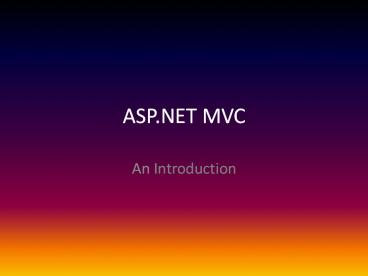ASP.NET MVC - PowerPoint PPT Presentation
Title:
ASP.NET MVC
Description:
The ASP.NET MVC framework provides an alternative to the ... 3 ID fields (ID, ClientID, UniqueID)? Business logic tends to end up in codebehind ... – PowerPoint PPT presentation
Number of Views:4438
Avg rating:3.0/5.0
Title: ASP.NET MVC
1
ASP.NET MVC
An Introduction
2
What is MVC
The Model-View-Controller (MVC) is an
architectural pattern separates an application
into three main components the model, the view,
and the controller. The ASP.NET MVC framework
provides an alternative to the ASP.NET Web Forms
pattern for creating MVC-based Web applications.
The ASP.NET MVC framework is a lightweight,
highly testable presentation framework that (as
with Web Forms-based applications) is integrated
with existing ASP.NET features, such as master
pages and membership-based authentication. The
MVC framework is defined in the System.Web.Mvc
namespace and is a fundamental, supported part
of the System.Web namespace. Cont....
3
ASP.NET Webforms Pros
- Robust foundation
- Can scale well
- Drag and Drop for speed
- Easy to get started
- Very large user base
4
ASP.NET Webforms Cons
- Viewstate makes pages heavy
- Very complex page life cycle
- 3 ID fields (ID, ClientID, UniqueID)?
- Business logic tends to end up in codebehind
- No Applications structure guidance
- View and Controller are mushed together
5
Why ASP.NET MVC
- Easier to test without IIS
- Page life cycle is greatly simplified
- Builds on top of ASP.NET
- Caching
- Authentication
- Master Pages
- Viewstate is gone
- Cleaner urls by default
6
Model
Domain objects
7
Model
Model objects are the parts of the application
that implement the logic for the application's
data domain. Often, model objects retrieve and
store model state in a database. For example, a
Product object might retrieve information from a
database, operate on it, and then write updated
information back to a Products table in SQL
Server.
8
View
Transforms objects to presentation
9
View
- Should be relatively dumb
- No business logic
- Only Display logic / Transformation
- JavaScript is valid for client side - jQuery
10
Controller
Well, its in control
11
Controller
- Controller has Actions
- Decides what data is needed
- Tells which View to render
- Tells the View what to render
- The view only displays information, the
controller handles and responds to user input and
interaction.
12
Webforms vs MVC
- ASP.Net Webforms
- faster starting point
- drag and drop
- ASP.NET MVC
- Unnecessary abstractions are gone
- Easier to Unit Test components
- Can write bad or good code in both
- Either can be complex or simple
13
Thank you































